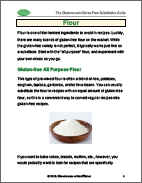Did your doctor recommend for you to take any supplements?
- Login to post comments
I think any doctor would suggest that you take a multi-vitamin. The same was true for my family doctor and GI doctor. Not only do I have to cut gluten out of my diet, I also have to cut out all nuts, tree nuts and coconuts due to allergies. There's where a lot of people get their protein, and I'm not a big meat eater...
It's important for anyone to eat a well balanced diet, but I'll be honest.. with my food allergies, my disease, my job and my hectic life in general (who's with me?) eating right is difficult. We need to make sure we're at least taking a multi-vitamin to make sure we're getting some important stuff in our bodies. You know which one I take? The CVS brand children's chewables. I have a problem swallowing pills first of all, and I needed to find something without gluten, shellfish (because some does give me an upset stomach) and coconut oil. My 2nd grade students giggle when they see the bottle on my desk. Some probably swallow pills.
In addition, people with Celiac Disease like myself face some other challenges. I have written about this in another post: Do you suffer from other sensitivities or conditions related to gluten? Many people with Celiac Disease can develop Osteoporosis earlier in life, so my GI doctor recommended that I take extra Vitamin D (D3-- for bone and immunity health) and make sure I get enough calcium in my diet. I'm not sure I get the extra calcium, so I might add that to my vitamin regimen. (Do they make that in a chewable?)
Many people with Celiac Disease also have anemia, or an iron deficiency. Some have to take iron pills (but please do not take iron pills unless directed to-- other health problems could occur). My iron is low, but luckily I am not at the point where I need to take a supplement. In addition to not eating much red meat, I am definitely considered "at risk." Checking my iron levels is a regular part of my blood work and it's always monitored.
Talk with your doctor, of course. Everyone is different.


 Click here to get a FREE GF Substitution Guide!
Click here to get a FREE GF Substitution Guide! 
 Sign-up to become a part of our gluten-free community. As a gift for being a free member, you can download our Gluten-Free Substitution Guide -- over 40 pages of great gluten-free substitutes. As a member, we will also send you our latest updates, recipes, and special offers. We'll try not to bug you and we won't share your info.
Sign-up to become a part of our gluten-free community. As a gift for being a free member, you can download our Gluten-Free Substitution Guide -- over 40 pages of great gluten-free substitutes. As a member, we will also send you our latest updates, recipes, and special offers. We'll try not to bug you and we won't share your info.
